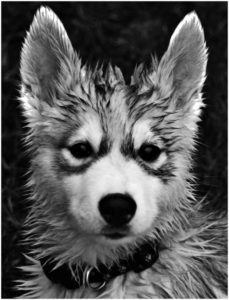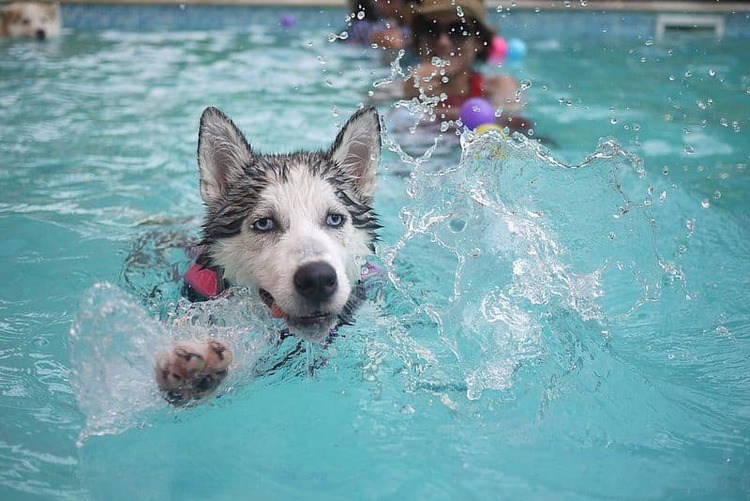Wondering when to run that next husky bath?
One of the first questions new husky owners find themselves asking is, “How often should you bathe a husky?“
As usual, the internet is full of different answers to this question — some useful and some misguided — but there is one guiding principle that all husky owners should know when it comes to washing their pup…
How Often Should You Bathe a Husky?
You should bathe your husky as little as possible.
Of course, that doesn’t mean neglecting your dog’s grooming and health.
You should still brush them regularly, treat them with a flea and tick program and take them to the groomers for dental care and toenail clipping.
But when it comes to physically washing them with shampoo yourself, we recommend only giving them a bath when they’re dirty or smelly.
If, for instance, they’ve been playing in the mud — or worse! — on a walk, it’s a good idea to give them a bath.
Some husky owners only bathe their canine companions around once a year, while most experts recommend you bathe them no more than once per month.
Why You Don’t Need to Bathe Your Husky Regularly

Huskies are incredibly intelligent animals who are able to do a lot of self-cleaning. While they may not be able to totally shower off a muddy coat, they will clean themselves regularly just like a cat would. They very rarely become smelly of their own accord — only if they’ve picked up something stinky in the park!
Not only is it generally not necessary to regularly bath your husky, but it’s actually much better for the condition of their skin and coats if you keep bathing to a minimum.
Like many other breeds, huskies are blessed with a double coat of hair: with the top being waxy and waterproof and the bottom layer downy and insulating. Frequent bathing will only serve to dry out the top coat, thinning the hair and eliminating the natural oils.
Just like humans, if care isn’t taken to use quality products, your dog can suffer from conditions like dandruff, frizzy hair and general dryness. It can exasperate shedding related issues, too.
Certain shampoos will only emphasise this problem, as they can be astringent and drying to a husky’s fur and skin, causing dermatological problems, itching and general discomfort. Always ensure that you use specialist dog shampoos that are of a natural origin and suitably gentle for your dog.
If your husky is inclined to get dirty often — we know how much they love those muddy puddles! — and requires more regular baths, only use shampoo occasionally and sparingly.
Usually water alone is enough to remove any dirt and odors.
Husky Bathing Tips
Thanks to their large size, most owners choose to get their huskies bathed at the groomers, where they have suitably sized equipment and wet rooms that most people wouldn’t possess at home.
If you do choose to take one for the team and go it alone, there are certain tips you can use to ensure that bathing your husky is harmonious as possible.

- Come prepared: make sure that you have towels, shampoo and treats on hand before you begin. If your dog requires a muzzle or any other restraint, make sure that’s in place before you place them in the bath or shower.
- Be liberal with praise and treats: many dogs dislike the ‘unknown’ factor of bathing, so it’s best to coax them into the situation and encourage them to come to view bathing as a fun pursuit.
- Brush before you bath: any mats will only become more entangled in the water so make sure that your huskies hair is as smooth as possible.
- Keep the water out: bring cotton balls to put in your dog’s ears and vaseline to put around the skin of their eyes to repel any water and keep them comfortable.
- Lukewarm temperature: dogs have much more sensitive skin than humans so make sure that the water isn’t too hot before you begin. Test it out with your elbow beforehand (like you would do for a baby bath) to make sure that they won’t get burned.
- Make sure you rinse: any shampoo residue will only serve to dull your dog’s coat and irritate their skin, so make sure it’s all out by rinsing thoroughly.
- Invest in a high-speed blower: don’t use a human hair-dryer on your husky as these are usually ineffectively small as well as too hot and drying on your dog’s coat. You can either let them air dry (get ready for lots of shedding!) or invest in a high-speed blower which will dry your dog’s coat while removing any dead hair which came loose during the bath.
Check out this video for how to bath your Siberian husky:
